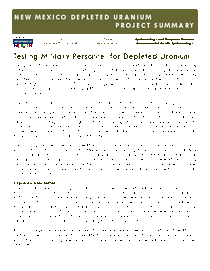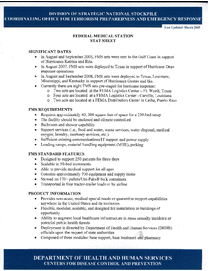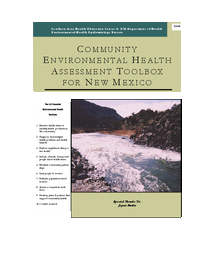General
 Depleted Uranium Project Summary
Biomonitoring Program - General
April 1, 2009
Depleted Uranium Project Summary
Biomonitoring Program - General
April 1, 2009
During the 2007 legislative session, Senate Bill (SB) 611 allocated $40,000 to develop a testing protocol, develop and establish a health registry, contract with appropriate testing laboratories and coordinate affected parties in regard to a voluntary testing program for military veterans who may have been exposed to depleted uranium or other isotopes in the Persian Gulf war or in the current Iraq or Afghanistan conflict.
 Federal Medical Stations Stat Sheet
Strategic National Stockpile - General
March 1, 2009
Federal Medical Stations Stat Sheet
Strategic National Stockpile - General
March 1, 2009
Significant dates, federal medical station requirements, standard features, and product information details.
 Community Environmental Health Assessment Toolbox
Environmental Health - General
October 20, 2004
Community Environmental Health Assessment Toolbox
Environmental Health - General
October 20, 2004
The Tool Box provides access to resources of varying types and specificity—from comprehensive procedural manuals and guidelines, to checklists and survey instruments, data sources, websites, and institutional contacts as well as general step-by-step guidance on best practices for implementing CEHA in New Mexican communities.
 PRAMS Survey for 2004-2008
Pregnancy Risk Assessment and Monitoring - General
January 1, 2004
PRAMS Survey for 2004-2008
Pregnancy Risk Assessment and Monitoring - General
January 1, 2004
This is the Pregnancy Risk Assessment and Monitoring System survey that was used for survey years 2004 through 2008.


